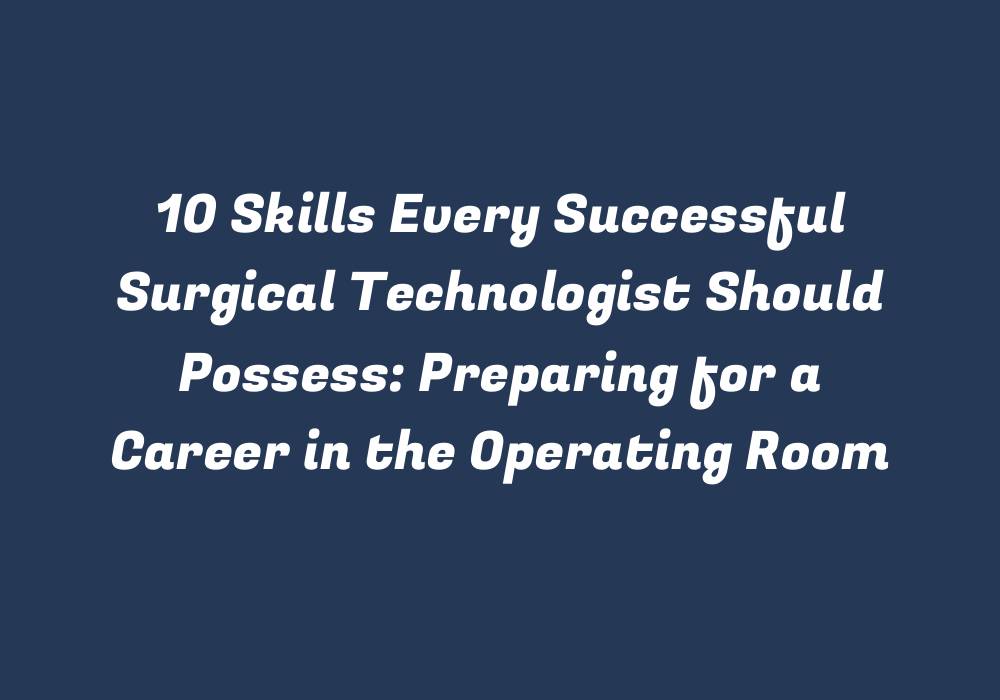10 Skills Every Successful Surgical Technologist Should Possess
In the rapidly growing field of healthcare, surgical technologists play a crucial role in assisting surgeons to perform safe and effective operations. They are an integral part of any operating room team, offering support and guidance to ensure smooth and successful procedures. As this profession becomes more competitive, it’s essential to possess specific skills that set you apart from the rest. In this article, we outline 10 important skills every surgical technologist should develop to prepare for a rewarding career in the operating room.
Communication and Teamwork
Effective communication is vital for any medical professional. As a surgical technologist, you’ll need to communicate with surgeons, nurses, anesthesiologists, and other team members during procedures. Listening carefully and adapting your approach based on the situation demonstrates professionalism and enhances patient care. Furthermore, being a team player is crucial since you’re working together to provide high-quality healthcare.
Technical Skills
Sterilization: Knowing how to properly sterilize instruments and equipment is an essential skill in maintaining a safe environment during surgeries. Adequate knowledge of various sterilization methods, such as steam sterilizers or chemical disinfection, will enable you to ensure that everything used during procedures adheres to the highest standards.
Instrumentation: Familiarity with different surgical instruments and their appropriate usage is critical for a successful operation. Knowing how each tool functions, where it should be placed, and its importance in specific surgeries will help you contribute effectively to the team’s success.
Professionalism and Attitude
Adaptability: As a surgical technologist, you must be ready to face unexpected situations. You may have to work in various settings or adapt quickly if complications arise during a procedure. Being able to handle changes with ease will enhance your effectiveness and help maintain a positive atmosphere in the operating room.
Attention to Detail: The smallest error can result in significant consequences during surgery. Therefore, paying attention to details is vital for ensuring patient safety. Attending training sessions and maintaining a clean work environment will contribute to this skill.
Education and Certification
Educational Background: A minimum of an associate’s degree in surgical technology or a related field is required. You should also pursue additional certification programs, which demonstrate your commitment to the profession and help boost your job opportunities.
Empathy and Compassion
Patient Care: Understanding patient concerns and showing compassion for their circumstances will contribute significantly to a positive surgical experience. Empathizing with patients and demonstrating kindness during difficult times can improve their overall care and promote healing.
Organizational Skills
Time Management: A well-organized operating room ensures efficient communication, teamwork, and patient safety. As a surgical technologist, you must maintain orderliness in your workspace and manage time effectively during procedures.
Inventory Management: Tracking and maintaining the inventory of supplies and instruments is vital to avoid unnecessary delays or complications during surgeries. Adequate organization will ensure that all necessary items are readily available when needed.
Leadership Qualities
Confidence: Displaying confidence in your skills and abilities as a surgical technologist will help you make effective decisions and motivate other team members during critical moments. This self-assurance is essential for navigating unforeseen challenges and maintaining a calm demeanor throughout the operation.
Continuous Learning
Adaptability: As surgical technology advances, new equipment and techniques are constantly introduced. Staying updated with these advancements will enhance your skills and ability to provide better care for patients. Pursuing continuous learning opportunities not only benefits you professionally but also contributes to the improvement of healthcare services.
In conclusion, possessing a diverse range of skills as a surgical technologist is paramount for success in this dynamic field. By developing technical expertise, fostering professionalism and empathy, embracing continuous learning, and maintaining organization, you will be well-equipped to excel in any operating room environment. These qualities not only contribute to personal growth but also enable you to deliver exceptional patient care throughout your career.
